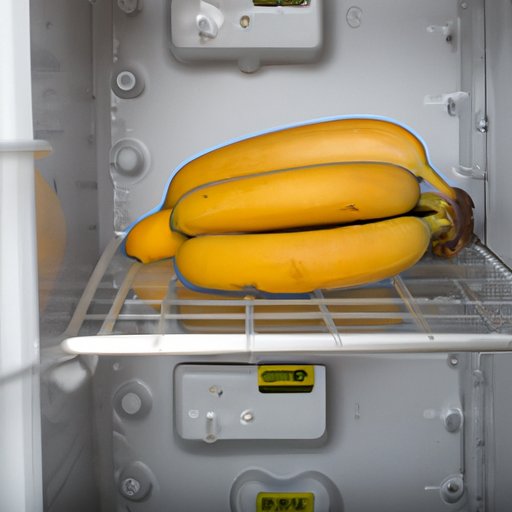Introduction
Bananas are a popular fruit that can be eaten raw or cooked. Many people enjoy eating bananas for their sweet flavor and nutritional benefits. But when it comes to storing bananas, there is some debate on whether you should put them in the refrigerator.
In this article, we’ll discuss the pros and cons of refrigerating bananas, as well as tips for keeping them fresh longer. We’ll also explore what happens when you refrigerate bananas and the ideal temperature for storing them.
Reasons You Shouldn’t Put Bananas in the Fridge
Bananas are a tropical fruit and do not tolerate cold temperatures well. If you put them in the fridge, the low temperatures can damage the fruit and cause it to become mushy and soft. This can also affect the flavor of the banana.
Additionally, bananas produce ethylene gas which accelerates ripening. When bananas are stored together, the ethylene gas from one banana will speed up the ripening process of the other. This can cause the banana skins to turn black or brown faster than if they were stored at room temperature.

How to Store Bananas for Maximum Freshness
For maximum freshness, store bananas at room temperature between 55-75°F. It’s best to keep them away from other fruits that emit ethylene gas, such as apples and tomatoes. Also, make sure to store them in a dry and dark place.
What Happens When You Refrigerate Bananas
If you put bananas in the fridge, the skin will turn black and the texture of the flesh will become mushy and soft. Additionally, the flavor of the banana will change due to the low temperatures.

What Temperature is Best for Storing Bananas
The ideal temperature for storing bananas is between 55-75°F. Avoid temperatures below 50°F as this can damage the fruit and cause it to spoil faster.

Tips for Keeping Bananas Fresh Longer
To keep bananas fresh longer, separate ripe and unripe bananas. This will prevent the ethylene gas from unripe bananas from speeding up the ripening process of the ripe ones. Additionally, wrap the stem of a bunch of bananas with plastic wrap. This will help prevent air from entering and causing the bananas to spoil faster. You can also place them in a paper bag to trap ethylene gas.
The Pros and Cons of Refrigerating Bananas
There are both pros and cons to refrigerating bananas. On the plus side, bananas will last longer in the fridge. However, they may lose some of their flavor and texture due to the cold temperatures.
Conclusion
In conclusion, bananas are a popular and nutritious fruit that many people enjoy. While you can store them in the refrigerator, it’s best to keep them at room temperature between 55-75°F. This will ensure that the bananas stay fresh and flavorful. Additionally, you can use tips like wrapping the stem of the bunch and placing them in a paper bag to keep them fresh longer. Ultimately, it’s up to you to decide whether or not to refrigerate your bananas.


